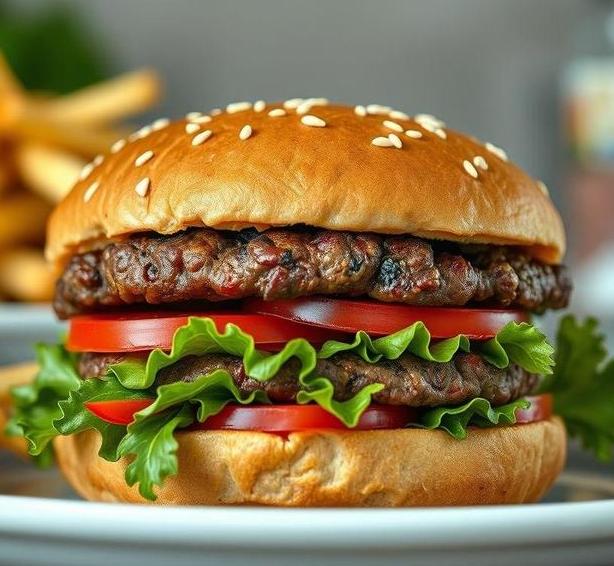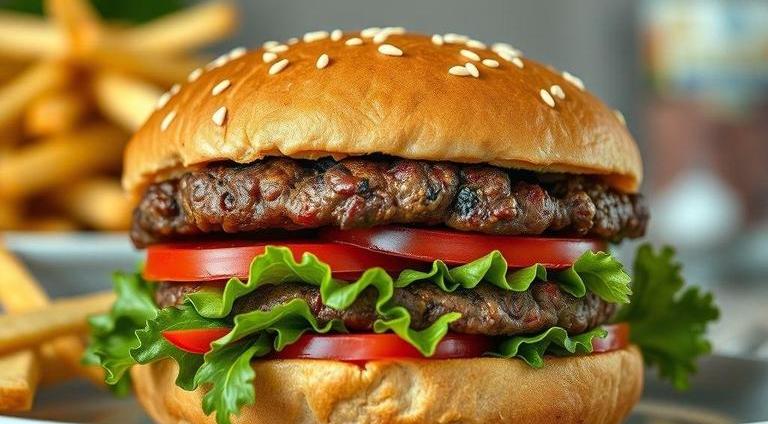Plant-based burgers have come a long way in recent years. Once a niche market catering mainly to vegetarians and vegans, these delicious, meat-free alternatives have expanded into the mainstream. With rising demand, brands like Beyond Meat, Impossible Foods, and various others have introduced an array of plant-based options that resemble beef burgers in taste, texture, and appearance. Whether you’re trying to reduce your meat intake or simply curious about alternative protein sources, plant-based burgers are a solid choice.
But like all food, they don’t last forever. So, if you’ve bought a pack and aren’t sure when to use it, or maybe you’ve found an old burger patty in your freezer or fridge, you’re likely asking: Can plant-based burgers go bad? If so, what are the signs to look out for? And, most importantly, how can you store them to maximize their shelf life?
Let’s dive into everything you need to know to keep your plant-based burgers fresh and tasty!
Can Plant Based Burgers Go Bad?
Absolutely, plant-based burgers can go bad. Even though they aren’t made from animal products, they still contain perishable ingredients that can spoil. These patties usually contain a combination of plant proteins, fats, and various additives, which, over time, break down and can lead to spoilage.
The primary factors that contribute to the spoilage of plant-based burgers are:
- Bacteria Growth: Like any food, if plant-based burgers are stored improperly, harmful bacteria such as E. coli or Salmonella can start to grow.
- Degradation of Ingredients: The fats (usually derived from plants like coconut or soy) can go rancid. The proteins and other components can also lose their freshness and taste.
- Environmental Exposure: If exposed to heat, moisture, or air, plant-based burgers can degrade faster, which is why proper storage is key.
While plant-based burgers don’t spoil as quickly as animal-based burgers, they are still susceptible to these issues. It’s essential to know the signs of spoilage and how to store them to make them last longer.
Shelf Life For Plant Based Burgers

The shelf life of plant-based burgers depends on the specific brand, how they’re packaged, and whether they are stored in the fridge or freezer. Here’s a general breakdown of shelf life:
-
Unopened (Refrigerated Plant-Based Burgers)
- Best-by date: Most plant-based burger patties will have a “best by” or “use by” date printed on the packaging. Typically, you can expect unopened refrigerated burgers to last for 7-10 days past this date, depending on the brand and specific ingredients. Always check the packaging for any extra information or guidelines.
- Freezing option: If you don’t plan on using the burgers before the “best by” date, freezing is an excellent option. Most plant-based burger patties freeze well for 6 months or even longer if stored properly.
-
Opened (Refrigerated)
- Once opened, plant-based burgers generally last 3-5 days in the fridge. The key to keeping them fresh is ensuring they are stored in an airtight container or tightly wrapped to prevent air and moisture exposure.
-
Frozen
- If you’ve frozen your plant-based burgers, you can safely keep them for up to 6 months. However, the longer they’re stored, the more their quality might deteriorate, especially in terms of texture and taste.
- To prevent freezer burn, ensure your burgers are tightly wrapped or stored in an airtight freezer bag.
Common Signs Of Spoilage
Knowing how to identify when your plant-based burgers have gone bad is crucial to avoid eating spoiled food. Here are the most common signs to look out for:
- Off Smell: The most obvious sign of spoilage. If your plant-based burger gives off a sour, rancid, or otherwise strange odor, it’s time to toss it. The fats used in the burgers, particularly oils like coconut or canola oil, can go rancid over time.
- Discoloration: Fresh plant-based burgers should have a consistent, rich color. If they begin to turn dull or greyish, this could be an indication that the patty is no longer fresh. A greenish tint or any blackened areas suggest mold growth.
- Texture Changes: Plant-based patties that have gone bad might become slimy or overly dry. If you notice a slimy or sticky texture on the surface, especially after being in the fridge for a while, it’s best to discard them.
- Mold Growth: Just like any other food, mold is a clear sign that your plant-based burger has spoiled. Mold can be white, green, or even black in color. If you see any, don’t hesitate-throw the burger out!
- Excessive Freezer Burn: If your frozen plant-based burger is covered in ice crystals or has dried-out areas, it’s a sign of freezer burn. While freezer burn doesn’t necessarily make food unsafe to eat, it can negatively impact the texture and flavor of the patty, so it might not be very appetizing.
How To Store Plant Based Burgers?

Proper storage is key to extending the shelf life of your plant-based burgers. Here’s a guide on how to store them effectively:
-
Refrigeration
- If you plan to use the burgers within a few days, store them in the fridge. Keep them in their original packaging if it’s airtight, or transfer them to a sealed container or a resealable bag.
- To avoid cross-contamination, keep them on the bottom shelf of the fridge, away from other foods, especially raw vegetables or meats.
- If you’ve opened the package but won’t finish it all in one sitting, wrap the remaining patties tightly in plastic wrap, wax paper, or aluminum foil and store them in an airtight container.
-
Freezing
- Freezing is an excellent way to prolong the shelf life of your plant-based burgers. If the burgers are in their original packaging and are vacuum-sealed, that’s already a great start. Otherwise, wrap them tightly in plastic wrap, then place them in a freezer-safe bag or container to prevent air exposure.
- Consider freezing the patties individually if you don’t plan on using the whole pack at once. This makes it easier to defrost only the amount you need.
- Avoid Storing in the Door of the Fridge: The door is the warmest part of the fridge, which can cause plant-based burgers to deteriorate quicker. Store them in the main section of the fridge, preferably near the back.
Expert Tips
To ensure the freshest, most flavorful plant-based burgers, follow these expert tips:
- Check Ingredients and Packaging: Some plant-based burgers contain preservatives, while others don’t. Always check the ingredients for clues on the potential shelf life. Preservatives can extend the shelf life of refrigerated patties.
- Don’t Refreeze: Once a plant-based burger has been thawed, it’s best not to refreeze it, as this can compromise both texture and taste. Instead, plan to use what you’ve thawed within a few days.
- Use a Fridge Thermometer: Keeping your fridge at the optimal temperature (34°F-40°F or 1°C-4°C) will slow down spoilage. A thermometer can help you monitor the temperature to ensure your burgers stay fresh.
- Batch Cook and Freeze: If you regularly eat plant-based burgers, consider cooking them in bulk and freezing them after preparation. This helps ensure that you have a quick, ready-to-eat option whenever hunger strikes, while preserving their freshness.
- Mind the Texture: Some plant-based burgers can get soft or mushy once thawed. If this happens, consider incorporating them into stews, wraps, or other dishes where the texture won’t be as noticeable.
FAQs
Can Plant-based Burgers Go Bad After Opening?
Yes, plant-based burgers can go bad after opening, just like any other perishable food item. Once opened, they should be stored properly in the refrigerator and consumed within a certain time frame, typically 3 to 5 days, depending on the brand and storage conditions.
How Can I Tell If A Plant-based Burger Has Gone Bad?
Signs that a plant-based burger has gone bad include a sour or off smell, changes in color (such as becoming darker or discolored), slimy texture, or mold growth. If any of these occur, the burger should be discarded.
Do Plant-based Burgers Need To Be Refrigerated?
Yes, plant-based burgers need to be refrigerated to maintain freshness and prevent bacterial growth. Unopened packages can typically stay in the refrigerator until the expiration date, while opened ones should be eaten within a few days.
Can Plant-based Burgers Be Frozen To Extend Shelf Life?
Yes, plant-based burgers can be frozen to extend their shelf life. Most brands offer freezer-friendly options, and if you freeze the burgers before the ’use by’ date, they can last for up to 6 months in the freezer.
How Long Can I Store Plant-based Burgers In The Fridge?
Once opened, plant-based burgers can be stored in the fridge for about 3 to 5 days. Unopened burgers can be stored in the fridge up until the expiration date printed on the package.
Can Plant-based Burgers Spoil If Left At Room Temperature?
Yes, plant-based burgers can spoil if left at room temperature for too long. Perishable foods should not be left out for more than 2 hours, or 1 hour if the temperature is above 90°F (32°C).
What Happens If You Eat A Plant-based Burger That Has Gone Bad?
Eating a spoiled plant-based burger can lead to foodborne illnesses such as nausea, vomiting, or diarrhea. It is always best to err on the side of caution and avoid consuming a burger that shows signs of spoilage.
Can I Eat Plant-based Burgers Past Their Expiration Date?
It’s not recommended to eat plant-based burgers past their expiration date, as they may have started to degrade in quality and safety. Always check for signs of spoilage before consuming.
How Can I Prevent Plant-based Burgers From Going Bad?
To prevent plant-based burgers from going bad, store them in the fridge at or below 40°F (4°C), and if you’re not planning to use them soon, consider freezing them. Always ensure they are sealed tightly to avoid contamination.
Do Plant-based Burgers Spoil Faster Than Regular Meat Burgers?
Plant-based burgers generally have a similar shelf life to regular meat burgers when stored properly, though some brands may contain fewer preservatives. Plant-based burgers can spoil faster if not refrigerated properly due to their high moisture content.